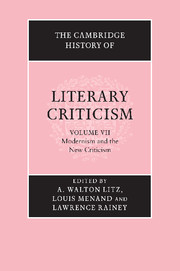Book contents
- Frontmatter
- Introduction
- THE MODERNISTS
- THE NEW CRITICS
- THE CRITIC AND THE INSTITUTIONS OF CULTURE
- 14 Criticism and the academy
- 15 The critic and society, 1900–1950
- 16 The British ‘Man of Letters’ and the rise of the professional
- 17 F. R. Leavis
- 18 Lionel Trilling
- 19 Poet-critics
- 20 Criticism of Fiction
- Bibliography
- Index
- References
15 - The critic and society, 1900–1950
from THE CRITIC AND THE INSTITUTIONS OF CULTURE
Published online by Cambridge University Press: 28 March 2008
- Frontmatter
- Introduction
- THE MODERNISTS
- THE NEW CRITICS
- THE CRITIC AND THE INSTITUTIONS OF CULTURE
- 14 Criticism and the academy
- 15 The critic and society, 1900–1950
- 16 The British ‘Man of Letters’ and the rise of the professional
- 17 F. R. Leavis
- 18 Lionel Trilling
- 19 Poet-critics
- 20 Criticism of Fiction
- Bibliography
- Index
- References
Summary
Surveying the state of criticism in 1891, Henry James wrote: ‘If literary criticism may be said to flourish among us at all, it certainly flourishes immensely, for it flows through the periodical press like a river that has burst its dikes. The quantity of it is prodigious … Periodical literature is a huge, open mouth which has to be fed – a vessel of immense capacity which has to be filled.’ Filling this maw, James found, was a great deal of uninspired chatter of a generalised, mechanical kind, a deluge of ‘reviewing’ that ‘in general has nothing in common with the art of criticism’: ‘What strikes the observer above all, in such an affluence, is the unexpected proportion the discourse uttered bears to the objects discoursed of – the paucity of examples, of illustrations and productions, and the deluge of doctrine suspended in the void.’
Besides this periodical literature there was also academic scholarship that was either genteel-Arnoldian, concerned with upholding certain moral and social values, or historical-philological, oriented toward establishing literary facts, mainly biographical, and exact texts, some of which – the poems of Donne and other metaphysical poets, for example – would prove essential to the critical revolution that followed. But especially in America, there was little that we today – with our ingrained emphasis on close reading, with our view of literary commentary as professional discourse yet also as a political and social argument – would describe as criticism. Two longtime antagonists, the humanist Paul Elmer More and his iconoclastic opponent, H. L. Mencken, could agree on one thing: the sheer paucity of genuine aesthetic criticism in the first decade of the twentieth century, when each began writing. ‘When I did most of my work’, wrote More, ‘there was almost a critical vacuum in this country and in England … It was something of an achievement – I say it unblushingly – just to keep going in such a desert.’ Mencken said much the same thing. ‘When I began to practice as a critic, in 1908, … it was a time of almost inconceivable complacency and conformity.’
- Type
- Chapter
- Information
- The Cambridge History of Literary Criticism , pp. 322 - 376Publisher: Cambridge University PressPrint publication year: 2000

